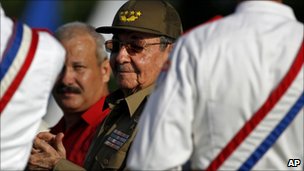
Cuba watchers and analysts pick apart every move, every statement in Washington or Havana that might be a political / economic / diplomatic bellwether and yet on a daily basis, particularly lately, we find ourselves stymied in the art of predicting the “what next.” Fidel emerges unexpectedly for a string of appearances after years out of the public eye. Havana agrees to release prisoners that it had long defended its right to hold, even as recently as a few weeks ago indicating that it would not “be pressured” by internal dissidents and external international actors to change its policies. And yesterday, la día de la revolución in Cuba, when many onlookers expected one or both of the Castros to seize the opportunity for a speech and an acknowledgement of one kind or another of recent developments, as we looked on intently, neither stood up.
Indeed, for the first time in 50 years neither Fidel nor Raúl gave the Revolution Day address to the nation. Instead, Vice President José Ramón Machado Ventura was given the podium. Cubans were as surprised as the rest of us, as they expected a statement on plans for economic reform from the head of state. Machado presented little in that regard, and nothing like the outlines of a new initiative.
Next week is the National Assembly meeting: perhaps that will be the occasion for a comprehensive statement on any one or a number of these topics? Or is the Revolution Day speech an indication of a new system of sharing power and authority as the old guard in Havana continues to plan for its transition to a new generation of leadership? I hesitate to predict anything in these recent weeks, where surprise after surprise is showing that in so many cases the United States and Cuba do not know each other as well as they believe. And that, actually, should really not be surprising at all.
(Photo: Associated Press)